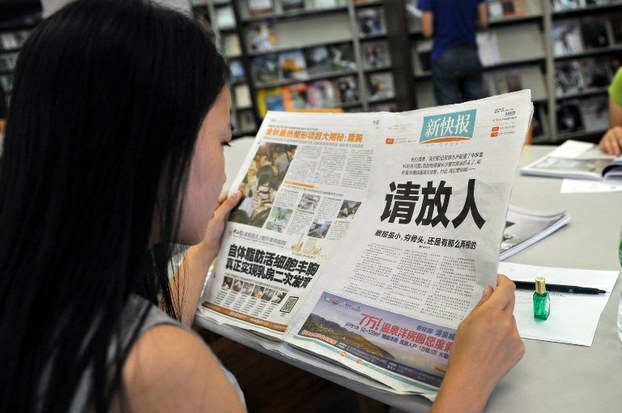




A Guangzhou-based newspaper at the heart of a row over a detained reporter has apologized for running front-page articles calling for his release, after China's state-controlled media reported he has confessed to taking bribes.
But the moves have not silenced critics of the detention of New Express reporter Chen Yongzhou
The New Express made the apology just days after running a front-page banner headline in support of Chen, which read simply, "Please release him."
In a statement carried on its front page on Monday, the paper's editors said they had failed to fact-check a number of stories written by Chen alleging financial irregularities at heavy machinery manufacturing company Zoomlion.
The paper apologized for "seriously damaging the credibility of the media" following a televised confession by a handcuffed Chen aired on state broadcaster CCTV at the weekend.
"A preliminary police investigation showed that our reporter Chen Yongzhou had been incited by others to write numerous inaccurate stories in exchange for money, seriously violating the China News Workers' code of Professional Ethics and the principle of news authenticity," the newspaper said in a front-page statement.
No clarification
But the paper did not clarify from whom Chen, 27, received the money or at whose request he wrote the stories, state-run Xinhua news agency reported.
An employee who answered the phone at the New Express on Monday declined to comment.
"I'm sorry, but we aren't giving interviews about this matter now," the employee said. "If there are any updates, they will be published on our microblog account."
Neither the apology nor the "confession" have put an end to public criticism of Chen's detention, however.
"This is trial by public opinion," Beijing-based rights lawyer Xie Yanyi said in an interview on Monday. "This is tantamount to an obstruction of justice."
"If the police gave this video to CCTV, then it violates his right to privacy as a citizen. There are problems with all of this."
Rights lawyer Chen Jiangang said CCTV's broadcast went against legal procedures.
"From a judicial point of view, it's clearly illegal to use this method of leaks," he said, asking "[What] if the media leaks information about a case publicly...before a trial has taken place or before he's been charged."
"They are using public opinion to influence the outcome of the trial."
Collaboration
He said the broadcast demonstrated a clear collaboration between CCTV, the police, and the detention center.
"How many other media could get in and conduct an interview inside a detention center with a suspect when the case was still being investigated?" Chen Jiangang said.
Chen Yongzhou was arrested earlier this month on suspicion of "fabricating facts" in more than a dozen articles about "financial problems" at Zoomlion, which were published between Sept. 29, 2012 and Aug. 8, 2013 about Zoomlion’s “financial problems."
Police said the reports hadn't been verified, and had caused "substantial losses" to the company and its share price.
Chen confessed that only “one and a half” of his more than 10 reports about Zoomlion were written after gathering information himself,
while the rest were based on text provided by an unnamed party, Xinhua said, claiming he hadn't even read some of the articles.
While all Chinese newspapers are tightly controlled by the propaganda department of the ruling Chinese Communist Party, some continue to push the limits set down for them, in particular through investigative reporting of alleged corruption.
Chen's arrest, which came amid growing curbs on freedom of expression and a crackdown on online "rumors," sparked public outrage, particularly among Chinese netizens.
Detention 'illegal'
Hangzhou-based freelance journalist Zan Aizong said Chen's detention was still illegal, regardless of the "confession."
"Even if he did take bribes, there is still nothing wrong in calling for public supervision of official power, nor in calling for freedom of the press," he said.
"I don't think the issue of public supervision and press freedom are Chen Yongzhou's individual problem."
Reported by Grace Kei Lai-see for RFA's Cantonese Service, and by Xin Yu for the Mandarin Service. Translated and written in English by Luisetta Mudie.